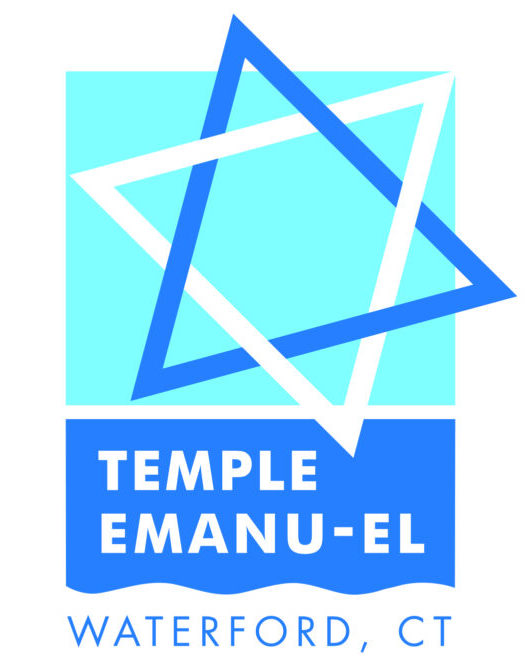From the Rabbi's Desk
| Friends,
It is dark in the depths of winter. We have just begun the secular new year, 2026. I want to take us back a couple of weeks to the first night of Chanukah. Many hours before Chanukah began in Eastern Connecticut, the Jewish community of Sydney, Australia, was celebrating at Bondi Beach. The celebration was turned deadly by two gunmen, allegedly associated with and inspired by ISIS. Fifteen people were killed, and forty were injured. This attack isn’t isolated. It is part of rising antisemitism in Australia, around the world, and here in the United States. We are not wrong when we feel anxiety here in the wake of Sydney. It is not that long ago that we witnessed the firebombing attack in Boulder, Colorado. It is also not that long ago that two Israeli embassy employees were gunned down in Washington, DC. These incidents form a pattern we cannot ignore. And it seems impossible to separate these violent acts from the normalization of the rising tide of white supremacy and neo-Nazi ideology, as evidenced recently and repeatedly by the tacit support, willing blindness, or professed ignorance of the likes of Nick Fuentes, who outrageously stated his admiration for Adolf Hitler. He is not alone. It seems implausible—and inexcusable—that government officials, civic leaders, and elite intellectuals claim ignorance of this rising tide and those who enable it. We are living in dark times. Yet, we are not powerless. Let’s travel back again in time to the first night of Chanukah. This time to the Social Hall right here at Temple Emanu-El. Many of you were part of a nearly standing room only crowd gathered for the annual Brotherhood Latke and Brisket Chanukah dinner. Though I was home recovering from Covid, I was thrilled to hear that 136 people attended the dinner and witnessed the first light of the festival illuminated on our historic Chanukiah. In the ten years that I have been rabbi at Temple Emanu-El, we have consistently had high attendance at these dinners, but I think I am safe saying that 136 is the highest attendance of these ten years. For many of you, the dinner is a social gathering, but it is symbolic of much more, just as the light of the Chanukiah is symbolic of much more than the festival. The light of the Chanukiah represents our willingness to fight when necessary for our right to freely practice our religion and be openly and unapologetically Jewish in our communities, free of antisemitism. But more important than our willingness to fight is our willingness to carry the light of Torah in all the places we interact in our communities, at home, at work, and in civic life. When we gather here for Chanukah, we connect our community to every other Jewish community in our nation and around the world. We sense our power and resilience as a people and are energized. Although we have all put away our Chanukiot, the light remains in us, to be spread by us. We are the carriers of the light of Torah, the light that continually grows and beats back ignorance, hatred, and racism. With the light, we partner with others to uplift the American principles of liberty, justice, and democracy that protect us all. We carry the light to guide us through these dark times. L’shalom, Rabbi Marc |
Cantorial Notes
| January 2026
Welcome 2026! Another flip of the calendar with lots of things going on here at Temple Emanu-El! Here are two that are extra special to me: the choir singing and Cabaret. Cabaret Night is around the corner! If you are interested in participating on Saturday, February 7, please come on Sunday, January 11, from 12:30 – 3:00 to stop by and present your act. It doesn’t need to be perfect. It does help us to place your act. You’ll have 5 minutes from the time you step up on the stage to the end of your song, dance, poetry reading, comedy act,skit, etc. Please send an email to Armi Rowe or me, or call me at Temple Emanu-El, and let us know you’ll be there. Looking forward to seeing you there. Rosh Chodesh will be on January 15, at 1:00 in the Sanctuary. On Friday, January 30, the Temple Emanu-El Choir will be singing for our Kabbalat Shabbat Service. This will be Shabbat Shirah, the “Sabbath of Song”. Jeff Elkin and I will be chanting Shirat Hayam, the Song of the Sea, Mose’s song, which tells the story of the splitting of the Reed Sea. It is found in the Torah portion, B’shallach, Exodus, chapter 15. After fleeing Egypt, the Israelites come to the shore of the Yam Suf, the Reed Sea, as the Egyptian Charioteers are coming up behind them ready to take the Israelites back to Egypt. G*d tells Moses to raise his arms and the sea parts! The Israelites are able to cross to the other side before the Egyptian Charioteers catch them. I remember watching the movie The 10 Commandments on TV when I was a kid. I loved when the Reed Sea parted and we were saved! The 18 verses of the story are not only written differently in the Torah Scroll, to reflect the Israelites walking through the Reed Sea, but they are chanted in an interesting way. The parts of the story where G*d’s name appears are chanted with a different melody than the rest of the story, which is read with traditional Torah Cantillation. We add verses 19-22, which includes Miriam picking up her timbrel and leading the people in song and dance. I hope you will join us for that very Special Shabbat. May the Divine Source help us to work towards turning fear into love, love into Social Action, and Social Action into peace. B’shir, Hazzan Sherry |
Presidential Message
| January 2026
As we enter the month of January, I want to extend my warmest wishes to each of you for a joyful, healthy, and peaceful New Year. I hope your holiday season—whether marked by the lights of Hanukkah, the warmth of Christmas with family, or the simple blessings of time together—brought meaning and renewal to your home. The turning of the calendar invites us to reflect, reconnect, and look ahead with optimism for all that 2026 will bring to our Temple community. This past month, our leadership took an important step in strengthening the safety and preparedness of Temple Emanu-El. We conducted a Table-top Security Exercise with participation from our Board of Directors, staff, and key members of our congregation. This exercise was guided by our partners at the Secure Community Network (SCN), including Michael Shanbrom, whose expertise and steady approach helped us evaluate real-world scenarios and refine our response plans. We were also joined by Rachel Levy, Executive Director of the Jewish Federation of Eastern Connecticut, whose insight and support continue to be invaluable, as well as representatives from the Waterford Police Department, who offered practical guidance to help ensure our building and community remain as safe as possible. I want to extend a very special and heartfelt thank-you to our Security Chairman, Rich McCaffrey. Rich has dedicated countless hours—much of it behind the scenes—to making sure Temple Emanu-El is prepared, protected, and aligned with best-practice security standards. His leadership made this exercise not only possible, but highly effective. These efforts reflect our shared commitment: that Temple Emanu-El remains a welcoming, vibrant home for worship, learning, and community, while also being a place where every member, every visitor, and every child feels secure. As we begin this new year together, I am filled with gratitude—for your participation, your generosity, your trust, and your continued partnership in building a strong and resilient congregation. May 2026 bring blessings of health, joy, and peace to you and your loved ones. Warmly, John Murphy President, Temple Emanu-El president@tewaterford.org | 860-608-0774
|
Related Pages:
About Us
Our History
Our Leadership
Directions


